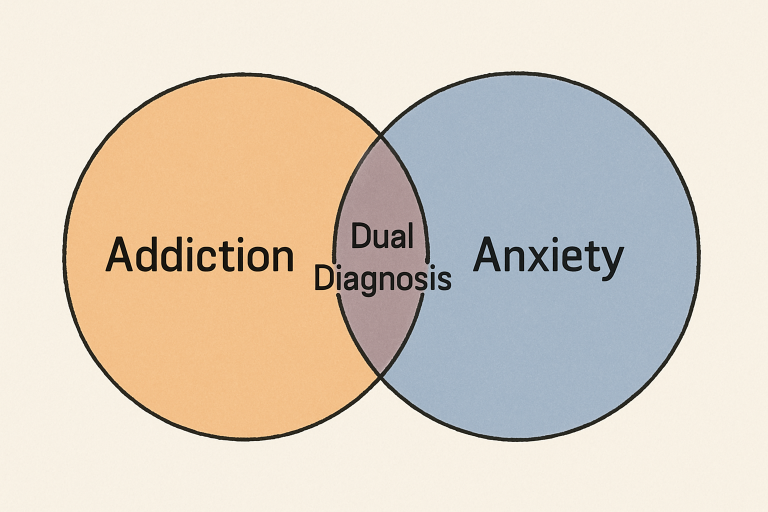Table of Contents
- 1 Understanding the Link Between Addiction and Anxiety
- 2 The Role of Rehab in Treating Dual Diagnosis
- 3 Benefits of Integrated Treatment Approaches
- 4 Challenges in Dual Diagnosis Treatment
- 5 Importance of a Supportive Environment
- 6 Developing Healthy Coping Mechanisms
- 7 Seeking Professional Help
- 8 Conclusion
Understanding the Link Between Addiction and Anxiety
It is common for individuals who battle addiction to also suffer from anxiety disorders. This combination, known as dual diagnosis, creates a complicated scenario in which each condition can intensify the symptoms of the other. Unraveling the connection between these issues is the first step toward effective treatment and recovery.
For many, seeking professional support, such as that provided by rehab in Nashville, offers an opportunity to address both conditions simultaneously through integrated care. When left untreated, anxiety can push someone further toward substance use as a way to self-medicate. Conversely, addiction can deepen feelings of anxiety, creating a challenging cycle.
The Role of Rehab in Treating Dual Diagnosis
Modern rehab facilities recognize the importance of approaching addiction and anxiety together, not as isolated conditions. Their integrated treatment plans are designed to support both emotional healing and sobriety. According to HelpGuide, addressing substance abuse alongside mental health issues is crucial for lasting recovery, as treating one without the other often leads to relapse. This might include:
- Cognitive Behavioral Therapy (CBT): CBT focuses on helping individuals identify and adjust harmful thoughts or behaviors that fuel both anxiety and substance abuse.
- Dialectical Behavioral Therapy (DBT): DBT teaches emotional regulation and distress tolerance, vital skills for those facing dual diagnoses.
- Holistic and Complementary Therapies: Mindfulness, meditation, yoga, and art therapy can all help reduce anxiety and promote whole-person healing.

Benefits of Integrated Treatment Approaches
Combining therapies for addiction and anxiety increases the chances of sustained recovery. Interventions like self-guided virtual reality therapy are showing promise in reducing anxiety and supporting addiction recovery by giving patients new tools to cope with stressors. Studies indicate that such approaches can be efficient for individuals who may not respond to traditional therapies alone.
Challenges in Dual Diagnosis Treatment
Treating two co-occurring mental health conditions is not without its obstacles. Individuals with both addiction and anxiety face a greater risk of relapse, and standard treatment models may not always deliver the best results. Personalized care is essential, as people with both depression and anxiety have shown lower improvement rates during specific therapy interventions, highlighting the need for adaptable, patient-centric plans.
Importance of a Supportive Environment
Support is crucial in dual diagnosis recovery. Rehabilitation centers offer structured environments where clients are surrounded by understanding staff and peers who share similar experiences. This compassionate atmosphere fosters accountability, reduces feelings of isolation, and enhances engagement in the treatment process.
Additionally, group therapy, peer support meetings, and access to counseling help clients build a strong foundation for recovery and emotional wellness.
Developing Healthy Coping Mechanisms
Learning how to cope with anxiety and addiction triggers is a vital skill for long term recovery. Rehabilitation programs offer education and practice in effective self care techniques including mindfulness, breathing exercises, and regular physical activity. Establishing routines that incorporate stress management, healthy eating, and adequate sleep are also essential strategies for maintaining mental and emotional balance and reducing the risk of relapse. Resources such as Verywell Mind, which offers a guide to forty healthy coping skills, provide additional practical methods to manage stress and emotions effectively.
Developing these skills not only strengthens resilience but also builds confidence in facing daily challenges. Over time, individuals gain healthier ways to respond to stress without turning to harmful substances. This proactive approach plays a crucial role in sustaining long term recovery.
Tools and Activities That Help
- Daily journaling or gratitude exercises
- Regular exercise (walking, swimming, yoga)
- Participating in creative outlets (music, art, writing)
- Connecting with support groups or online communities for continued encouragement
Seeking Professional Help
If you or someone you care about is grappling with both addiction and anxiety, turning to experienced professionals is a vital step. Licensed rehab centers offer comprehensive programs tailored to individuals with dual diagnoses, making it possible to progress through challenges with targeted therapies and structured support. Taking action as soon as possible increases the likelihood of achieving a fulfilling, healthy life.
Conclusion
The intersection of addiction and anxiety requires focused, compassionate, and integrated care. Rehab centers equipped to treat both conditions offer a proven pathway to lasting recovery, featuring evidence-based therapies, supportive communities, and robust aftercare. If you’re ready to break free from the cycle of addiction and anxiety, professional help can pave the way toward stability, restored well-being, and a brighter future.
